The Wakeman 70s
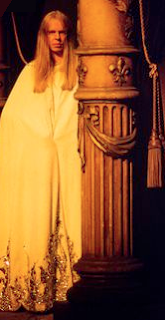 Rick Wakeman described himself at grammar school as "a horror." Due to his lack of discipline he needed to pass 8 music exams to earn his A-levels, which required him, as his mother remembered, "to do two years' work in ten months". Wakeman's music teacher gave him determination after betting him ten shillings that he would not succeed. With that, Wakeman secured a place at the Royal College of Music, where he studied piano, clarinet, orchestration, and modern music. His intention was to become a concert pianist, yet the reality was a relaxed attitude with regard to his studies that included drinking in pubs, missing lectures and spending his spare time at a music shop in Ealing. Still, early in 1968 Wakeman met producers Tony Visconti, Gus Dudgeon, and Denny Cordell, and was offered studio session work for Regal Zonophone Records.
Rick Wakeman described himself at grammar school as "a horror." Due to his lack of discipline he needed to pass 8 music exams to earn his A-levels, which required him, as his mother remembered, "to do two years' work in ten months". Wakeman's music teacher gave him determination after betting him ten shillings that he would not succeed. With that, Wakeman secured a place at the Royal College of Music, where he studied piano, clarinet, orchestration, and modern music. His intention was to become a concert pianist, yet the reality was a relaxed attitude with regard to his studies that included drinking in pubs, missing lectures and spending his spare time at a music shop in Ealing. Still, early in 1968 Wakeman met producers Tony Visconti, Gus Dudgeon, and Denny Cordell, and was offered studio session work for Regal Zonophone Records.Wakeman became a busy session musician, quickly gaining the nickname, "One Take Wakeman." In June 1969, he played mellotron on David Bowie's "Space Oddity," and joined progressive folk band Strawbs until his return to session work in 1971. At this time he bought a Minimoog synthesizer at half price from actor Jack Wild, who thought that it was defective since it only played one note at a time. Like Emerson, Wakeman took the Moog to places no one knew it could go.
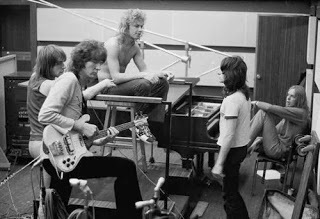 Rick played the iconic piano on Cat Stevens' "Morning Has Broken," but was omitted from the credits and never paid. (Stevens later apologized and paid Wakeman for the error.) Other session tracks from the period include "Get it On," "Life on Mars" and three tracks for Elton John's Madman Across the Water. In July 1971, Rick was faced with "one of the most difficult decisions" of his career, after Bowie invited him to play keyboards for his new backing band, The Spiders from Mars, with guitarist Mick Ronson. Wakeman then received a phone call at 2am from Chris Squire, the bass player of Yes, who explained that the band wanted a new keyboardist. Wakeman agreed to sit in with the band as they rehearsed their fourth album, Fragile.
Rick played the iconic piano on Cat Stevens' "Morning Has Broken," but was omitted from the credits and never paid. (Stevens later apologized and paid Wakeman for the error.) Other session tracks from the period include "Get it On," "Life on Mars" and three tracks for Elton John's Madman Across the Water. In July 1971, Rick was faced with "one of the most difficult decisions" of his career, after Bowie invited him to play keyboards for his new backing band, The Spiders from Mars, with guitarist Mick Ronson. Wakeman then received a phone call at 2am from Chris Squire, the bass player of Yes, who explained that the band wanted a new keyboardist. Wakeman agreed to sit in with the band as they rehearsed their fourth album, Fragile. The newly formed and classic Yes lineup made Fragile in five weeks. The album featured five tracks written by each member of the group, with Wakeman recording "Cans and Brahms", an adaptation of the third movement of Symphony No. 4 in E Minor by Johannes Brahms. Wakeman has called the track "dreadful," as contractual disputes between Atlantic Records and A&M Records, who he was with as a solo artist, prevented him from writing his own compositions. Fragile was released in November 1971 and peaked at number 4 in the US and number 7 in the UK. IN the 1972 Melody Maker readers poll, Wakeman came in 2nd behind Keith Emerson.
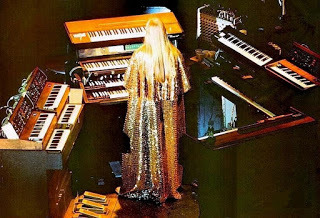 Yes recorded their fifth album, Close to the Edge, in 1972. It featured Wakeman on church organ at St Giles-without-Cripplegate in London. He received a long overdue writing credit on the third track, "Siberian Khatru.". Close to the Edge peaked at number 4 in the UK and number 3 in the US where it sold over a million copies.
Yes recorded their fifth album, Close to the Edge, in 1972. It featured Wakeman on church organ at St Giles-without-Cripplegate in London. He received a long overdue writing credit on the third track, "Siberian Khatru.". Close to the Edge peaked at number 4 in the UK and number 3 in the US where it sold over a million copies.During his sojourn with Yes, he released his first studio album, The Six Wives of Henry VIII, in January 1973. Recording took place from February to October 1972 with an advance of £4,000 from A&M Records. On 16 January 1973, the album was previewed with Wakeman performing excerpts on the BBC's Old Grey Whistle Test, afterward reaching number 7 in the UK and 30 in the US.
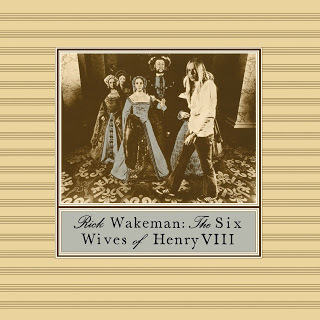 By 1973, Wakeman came out first in the top keyboardist category in Melody Maker, and during a break in the Topographic Oceans tour, he performed his new work, Journey to the Centre of the Earth, based on Jules Verne's science fiction novella. Wakeman met with his manager Brian Lane to pitch the idea of performing Journey in concert with an orchestra, choir, and a rock band. As the cost of producing the album in a studio was too high, A&M Records agreed to record the album live. Wakeman held two concerts at the Royal Festival Hall in London in January 1974 with the London Symphony Orchestra, the English Chamber Choir and actor David Hemmings.
By 1973, Wakeman came out first in the top keyboardist category in Melody Maker, and during a break in the Topographic Oceans tour, he performed his new work, Journey to the Centre of the Earth, based on Jules Verne's science fiction novella. Wakeman met with his manager Brian Lane to pitch the idea of performing Journey in concert with an orchestra, choir, and a rock band. As the cost of producing the album in a studio was too high, A&M Records agreed to record the album live. Wakeman held two concerts at the Royal Festival Hall in London in January 1974 with the London Symphony Orchestra, the English Chamber Choir and actor David Hemmings.The album was poorly received among A&M management; however, as Wakeman was under contract with A&M in the US, Jerry Moss (the M in A&M) insisted on the album's release. On 18 May 1974, his twenty-fifth birthday, Wakeman confirmed his departure from Yes to manager Brian Lane. He had heard some of the band's material for what became Relayer and felt unable to contribute to the music. Later in the day, he received a call from A&M Records, informing him that Journey to the Centre of the Earth had just entered the UK charts at number one. Wakeman received an Ivor Novello Award for the album and a Grammy Award nomination, with the album going on to sell 14 million copies worldwide.
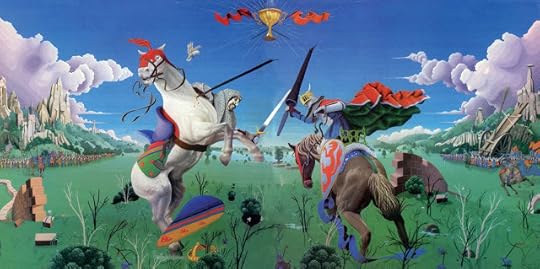
Despite his success, Wakeman's health had deteriorated, and in mid-1974, he suffered a heart attack. During his recovery in Wexham Park Hospital, he wrote the first song for his next concept album, The Myths and Legends of King Arthur and the Knights of the Round Table. Wakeman recorded King Arthur at Morgan Studios from October 1974 to January 1975, with the New World Orchestra, English Chamber Choir, and Nottingham Festival Vocal Group. The album was released in April 1975 and peaked at number 2 in the UK and number 21 in the US, earning Gold certification in Brazil, Japan, and Australia. A month later, Wakeman performed the album live for three sold out shows at Wembley Arena. As the arena floor was set up with ice, Wakeman decided to present the show on ice with fourteen skaters and a castle in the middle for the orchestra, choir, and his band. The eccentric shows were well received but expensive to produce, consuming much of the income from the album's sales. (The event came in at number 79 on the 100 Greatest Shocking Moments in Rock and Roll program by VH1.) The album sold over 12 million copies.
In these past 40 years, Rick Wakeman has produced a plethora of music, but it was the Wakeman 70s for which he will be remembered.
Published on July 17, 2018 14:53
No comments have been added yet.



